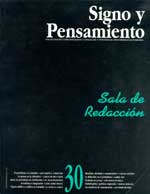Abstract
El artículo hace una aproximación al conflicto desde una perspectiva comunicativa partiendo de sus representaciones en el discurso editorial del diario El Tiempo, tomado como eje de análisis hechos de protesta pública ocurridos en Colombia entre 1987-1995, el trabajo concluye que en sus propuestas discursivas, El Tiempo valora negativamente el conflicto al considerarlo como una amenaza contra el orden democrático y por tanto, lo desplaza hacia los márgenes de lo político. El espacio público comunicativo se une como un escenario de controles que no debe admitir más conflictos que los ya establecidos por las agendas de la dirigencia política.This journal is registered under a Creative Commons Attribution 4.0 International Public License. Thus, this work may be reproduced, distributed, and publicly shared in digital format, as long as the names of the authors and Pontificia Universidad Javeriana are acknowledged. Others are allowed to quote, adapt, transform, auto-archive, republish, and create based on this material, for any purpose (even commercial ones), provided the authorship is duly acknowledged, a link to the original work is provided, and it is specified if changes have been made. Pontificia Universidad Javeriana does not hold the rights of published works and the authors are solely responsible for the contents of their works; they keep the moral, intellectual, privacy, and publicity rights.
Approving the intervention of the work (review, copy-editing, translation, layout) and the following outreach, are granted through an use license and not through an assignment of rights. This means the journal and Pontificia Universidad Javeriana cannot be held responsible for any ethical malpractice by the authors. As a consequence of the protection granted by the use license, the journal is not required to publish recantations or modify information already published, unless the errata stems from the editorial management process. Publishing contents in this journal does not generate royalties for contributors.


